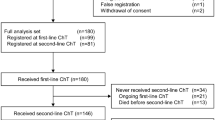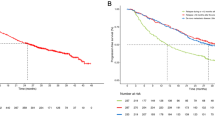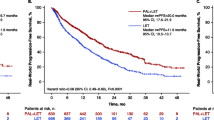Abstract
Introduction
HER2-negative metastatic breast cancer (MBC) is a common setting in which chemotherapy could be effective even in later lines of treatment. Oral etoposide has demonstrated clinical activity in this setting in small-scale studies, but its efficacy has not been compared to that of other chemotherapy regimens.
Methods
We used the ESME database (Epidemiological Strategy and Medical Economics), a real-life national French multicentre cohort of MBC patients initiating therapy between 1 January 2008 to 31 December 2014. HER2-negative MBC patients who received oral etoposide as > 3rd chemotherapy line and for more than 14 days were included. Primary objective was progression-free survival (PFS); secondary objectives were overall survival (OS), and propensity-score matched Cox models including comparison with other therapies in the same setting.
Results
Three hundred forty-five out of 16,702 patients received oral etoposide and 222 were eligible. Median PFS was 3.2 months [95% CI 2.8–4] and median OS 7.3 months [95% CI 5.7–10.3]. Median PFS did not significantly differ according to the therapeutic line. The only prognostic factor for both PFS and OS was the MBC phenotype (hormone receptor-positive versus triple-negative, HR = 0.71 [95% CI 0.52–0.97], p = 0.028 for PFS and HR = 0.65 [0.46–0.92], p = 0.014 for OS). After matching for the propensity score, no differential effect on PFS or OS was observed between oral etoposide and other chemotherapy regimens administered in the same setting (HR = 0.94 [95% CI 0.77–1.15], p = 0.55 for PFS and HR = 1.10 [95% CI 0.88–1.37], p = 0.40 for OS).
Conclusion
Oral etoposide retains some efficacy in selected heavily pre-treated patients with HER2-negative MBC, with the advantages of oral administration.




Similar content being viewed by others
References
Cardoso F, Senkus E, Costa A et al (2018) 4th ESO-ESMO International Consensus Guidelines for Advanced Breast Cancer (ABC 4)†. Ann Oncol 29:1634–1657. https://doi.org/10.1093/annonc/mdy192
Torre LA, Bray F, Siegel RL et al (2015) Global cancer statistics, 2012. CA Cancer J Clin 65:87–108. https://doi.org/10.3322/caac.21262
Pusztai L, Walters RS, Valero V et al (1998) Daily oral etoposide in patients with heavily pretreated metastatic breast cancer. Am J Clin Oncol 21:442–446
Atienza DM, Vogel CL, Trock B, Swain SM (1995) Phase II study of oral etoposide for patients with advanced breast cancer. Cancer 76:2485–2490
Nesković-Konstantinović ZB, Bosnjak SM, Radulović SS, Mitrović LB (1996) Daily oral etoposide in metastatic breast cancer. Anticancer Drugs 7:543–547
Martín M, Lluch A, Casado A et al (1994) Clinical activity of chronic oral etoposide in previously treated metastatic breast cancer. J Clin Oncol 12:986–991. https://doi.org/10.1200/JCO.1994.12.5.986
Valabrega G, Berrino G, Milani A et al (2015) A retrospective analysis of the activity and safety of oral Etoposide in heavily pretreated metastatic breast cancer patients. Breast J 21:241–245. https://doi.org/10.1111/tbj.12398
Jagodic M, Cufer T, Zakotnik B, Cervek J (2001) Selection of candidates for oral etoposide salvage chemotherapy in heavily pretreated breast cancer patients. Anticancer Drugs 12:199–204
Voutsadakis IA (2018) A systematic review and pooled analysis of studies of oral etoposide in metastatic breast cancer. Eur J Breast Health 14:10–16. https://doi.org/10.5152/ejbh.2017.3563
Delaloge S, Pérol D, Courtinard C et al (2016) Paclitaxel plus bevacizumab or paclitaxel as first-line treatment for HER2-negative metastatic breast cancer in a multicenter national observational study. Ann Oncol 27:1725–1732. https://doi.org/10.1093/annonc/mdw260
Gobbini E, Ezzalfani M, Dieras V et al (2018) Time trends of overall survival among metastatic breast cancer patients in the real-life ESME cohort. Eur J Cancer 96:17–24. https://doi.org/10.1016/j.ejca.2018.03.015
Jacquet E, Lardy-Cléaud A, Pistilli B et al (2018) Endocrine therapy or chemotherapy as first-line therapy in hormone receptor-positive HER2-negative metastatic breast cancer patients. Eur J Cancer 95:93–101. https://doi.org/10.1016/j.ejca.2018.03.013
Austin PC (2008) A critical appraisal of propensity-score matching in the medical literature between 1996 and 2003. Stat Med 27:2037–2049. https://doi.org/10.1002/sim.3150
Ming K, Rosenbaum PR (2000) Substantial gains in bias reduction from matching with a variable number of controls. Biometrics 56:118–124
R Core Team (2017) R: A language and environment for statistical computing. R Foundation for Statistical Computing, Vienna
Giannone G, Milani A, Ghisoni E et al (2018) Oral etoposide in heavily pre-treated metastatic breast cancer: a retrospective series. Breast 38:160–164. https://doi.org/10.1016/j.breast.2018.01.006
Saphner T, Weller EA, Tormey DC et al (2000) 21-day oral etoposide for metastatic breast cancer: a phase II study and review of the literature. Am J Clin Oncol 23:258–262
Palombo H, Estapé J, Viñolas N et al (1994) Chronic oral etoposide in advanced breast cancer. Cancer Chemother Pharmacol 33:527–529
Yuan P, Di L, Zhang X et al (2015) Efficacy of oral etoposide in pretreated metastatic breast cancer: a multicenter phase 2 study. Medicine (Baltimore) 94:e774. https://doi.org/10.1097/MD.0000000000000774
Cortes J, O’Shaughnessy J, Loesch D et al (2011) Eribulin monotherapy versus treatment of physician’s choice in patients with metastatic breast cancer (EMBRACE): a phase 3 open-label randomised study. Lancet 377:914–923. https://doi.org/10.1016/S0140-6736(11)60070-6
Munzone E, Colleoni M (2015) Clinical overview of metronomic chemotherapy in breast cancer. Nat Rev Clin Oncol 12:631–644. https://doi.org/10.1038/nrclinonc.2015.131
Cazzaniga ME, Dionisio MR, Riva F (2017) Metronomic chemotherapy for advanced breast cancer patients. Cancer Lett 400:252–258. https://doi.org/10.1016/j.canlet.2016.12.019
Cardoso F, Colleoni M, Di Leo A et al (2016) Oral chemotherapy in advanced breast cancer: expert perspectives on its role in clinical practice. Cancer Treat Commun 6:S1–S10. https://doi.org/10.1016/S2213-0896(16)06001-1
Palumbo R, Sottotetti F, Riccardi A et al (2013) Which patients with metastatic breast cancer benefit from subsequent lines of treatment? An update for clinicians. Ther Adv Med Oncol 5:334–350. https://doi.org/10.1177/1758834013508197
Planchat E, Abrial C, Thivat E et al (2011) Late lines of treatment benefit survival in metastatic breast cancer in current practice? Breast 20:574–578. https://doi.org/10.1016/j.breast.2011.07.010
Tacca O, LeHeurteur M, Durando X et al (2009) Metastatic breast cancer: overall survival related to successive chemotherapies. What do we gain after the third line? Cancer Invest 27:81–85. https://doi.org/10.1080/07357900802290580
Beauchemin C, Cooper D, Lapierre M-È et al (2014) Progression-free survival as a potential surrogate for overall survival in metastatic breast cancer. Oncol Targets Ther 7:1101–1110. https://doi.org/10.2147/OTT.S63302
Adunlin G, Cyrus JWW, Dranitsaris G (2015) Correlation between progression-free survival and overall survival in metastatic breast cancer patients receiving anthracyclines, taxanes, or targeted therapies: a trial-level meta-analysis. Breast Cancer Res Treat 154:591–608. https://doi.org/10.1007/s10549-015-3643-5
Liu L, Chen F, Zhao J, Yu H (2016) Correlation between overall survival and other endpoints in metastatic breast cancer with second- or third-line chemotherapy: Literature-based analysis of 24 randomized trials. Bull Cancer 103:336–344. https://doi.org/10.1016/j.bulcan.2016.01.002
Burzykowski T, Buyse M, Piccart-Gebhart MJ et al (2008) Evaluation of tumor response, disease control, progression-free survival, and time to progression as potential surrogate end points in metastatic breast cancer. J Clin Oncol 26:1987–1992. https://doi.org/10.1200/JCO.2007.10.8407
Sherrill B, Amonkar M, Wu Y et al (2008) Relationship between effects on time-to-disease progression and overall survival in studies of metastatic breast cancer. Br J Cancer 99:1572–1578. https://doi.org/10.1038/sj.bjc.6604759
Funding
This work was supported by R&D UNICANCER. The ESME MBC database is supported by an industrial consortium (Roche, Pierre Fabre, Pfizer, AstraZeneca, MSD, Eisai and Daiichi Sankyo). Data collection, analyses and publications are totally managed by R&D UNICANCER independently of the industrial consortium.
Author information
Authors and Affiliations
Corresponding author
Ethics declarations
Conflict of interest
The authors declare that they have no conflict of interest.
Ethical approval
The present analysis was approved by an independent ethics committee (Comité De Protection Des Personnes Sud-Est II- 2015-79). No formal dedicated informed consent was required but all patients had approved the re-use of their electronically recorded data. In compliance with French regulations, the ESME MBC database was authorized by the French data protection authority (Authorization No. 1704113).
Electronic supplementary material
Below is the link to the electronic supplementary material.
Rights and permissions
About this article
Cite this article
Cabel, L., Carton, M., Cheaib, B. et al. Oral etoposide in heavily pre-treated metastatic breast cancer: results from the ESME cohort and comparison with other chemotherapy regimens. Breast Cancer Res Treat 173, 397–406 (2019). https://doi.org/10.1007/s10549-018-5017-2
Received:
Accepted:
Published:
Issue Date:
DOI: https://doi.org/10.1007/s10549-018-5017-2




